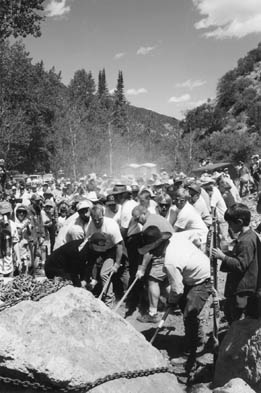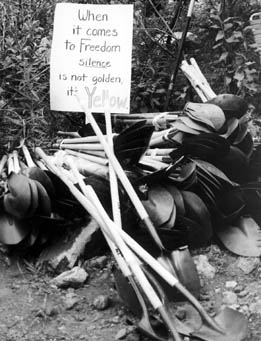|
|
|
| Subscriptions click here for 20% off! | E-Mail: info@rangemagazine.com |
|
|
|||||||||||
 |
INSPIRATION
|
||||||||||
From Jarbidge, Nevada, to
|
|||||||||||
| There were loggers from Montana and Idaho alongside miners from
Nevada and Colorado. There were ranchers from California and Wyoming
looking the same as farmers from Ohio and Kentucky and even fishermen
from the Atlantic Coast. The Elko County Sheriff’s office estimated
there were more than 700 in all crowded into the flat turn-around
space where the U.S. Forest Service had declared the South Canyon
Road closed since a flood in 1995. Already, they had accomplished what seemed at least unlikely by cutting a flat six-foot road into a hillside formed by the feds with heavy equipment at a cost of nearly $500,000. They–men, women and children–did it with shovels and picks and by hand, a rock at a time in a spirit more like a barn raising than a protest. Now they formed around the last remaining obstacle, a four-ton Volkswagon-sized boulder that the feds had buried in place as part of their claim that the road belongs to the Forest Service and not Elko County. The great rock had been wrapped in heavy chains and looped into attachment with coils of long, thick sea rope meant to hold ships in harbor. |
|||||||||||
| More than 100 strong men pulled the last obstacle from South Canyon Road, reclaiming it for the people of Elko County. | |||||||||||
 |
|||||||||||
| On the steep canyon slopes above the crowd, teams of mule skinners
awaited, ready to employ their animals if needed. But this last
effort belonged to the people and an eager line of more than 100
strong men. From his perch atop the impediment, the puller’s coach,
Jim Muth, told them, “This is the liberty rock, and we’re going
to move it to preserve our freedom!” On his count, the men pulled together on the ropes. “Liberty,” they grunted, and then “Freedom,” as the boulder slid with each tug a foot or two away from its blocking position. At last, after one more mighty pull, Jarbidge Shovel Brigade organizer Demar Dahl, beaming in delight, proclaimed, “This road is now open!” They all whooped and cheered, even some of the media among them. Helen Wilson, frail but still feisty in her 90th year as a resident of Jarbidge and its official historian, boarded a pickup truck for the honor of taking the first ride across the reopened road. “This road belongs to the people,” she said, “not the government.” It was a ride of hardly more than 200 yards, but it covered new ground created in a volunteer effort that to many there on this Independence Day was felt to be as symbolic and memorable as the first rounds on Bunker Hill. They all knew it could have been something more like that, and some had even backed out after press reports of “provacateurs” and “green radicals” planning to disrupt the Shovel Brigade. But the spirit of 2000 in Jarbidge was more than anything else one of brotherhood and freedom for all, including the two quiet ladies from “Old Broads for Wilderness” who made themselves apparent among the crowd and even accepted a souvenir shovel. The only close protest to the action came when a gangly runner in fashionably swept sun glasses came by and halted to hug the rock and tell it “hang in there, baby,” before heading off on his wilderness trail run. Even that runner, Fred Call of California, lingered a few moments for amiable conversation with Brigade members. He said the whole thing was “kooky,” and that it “scares the hell out of me,” but he was soon grinning and shaking hands among the blue-jeaned crowd that ignored the wild contrast of his purple running shorts. Federal agents, although they had made threatening noises for weeks, were completely absent, perhaps to diminish any possibility of violence or perhaps in hopes that the news media would give the whole affair only passing one-day attention. They could have no claim that any disruption was caused to the supposedly threatened habitat of the bull trout in the nearby stream, but they could still put the Shovel Brigade aside as a mere minority of malcontents. And that might be the case, except for the fact that the two-day effort to reopen the Jarbidge Road was clearly more an inspiration than it was an excavation. The whole summer population of Jarbidge–all 75 of them–could fit quite comfortably into just one of the five big school buses that hauled in Brigade volunteers from their staging area 30 miles north in Idaho. Every one of them, from states all across the nation, had their own story to tell about frustration over federal policies restricting the use of natural resources. In this one extremely remote Nevada canyon they found a symbolic way to express that frustration with some action of their own. “The shovel is a symbol, but more than that, it’s a tool,” said Scott Traut, a 34-year-old commercial fisherman from Rhode Island whose enthusiastic personality quickly won him a leadership role among the loosely organized Shovel Brigade. “I was standing up there with this guy, Dick Carver, who’s a rancher, I guess, and this other guy who’s a farmer. And I think what if these guys were on the East Coast where I am–what would they be doing? They’d be fishing, and they’d run into the same bureaucrats who won’t let them make a living. The shovel is a tool, we all use it, but it’s also like a wake-up call for us all to start digging in for our individual rights.” That’s the difference in whether Jarbidge will be the one-day story federal authorities hope it will be. Eight thousand shovels were donated to the effort by Montana lumberman Jim Hurst. A lot of them were purchased as trophies for $10 each by volunteers wanting to aid the effort, but even more went back to the trucks ready to begin a nationwide tour certainly reaching as far as Rhode Island. Traut for one rushed to make his flight home and back to work by July 6 aboard the 75-foot stern trawler Shelby Ann. He checked his shovel as part of his luggage. |
|||||||||||
|
To Subscribe: Please click here for subscription or call 1-800-RANGE-4-U for a special web price Copyright © 1998-2005 RANGE magazine last page update: 04.03.05 |
|||||||||||
